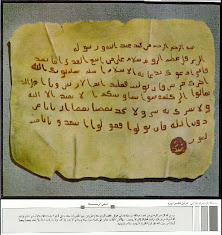Äntligen kan vi se muslimska lärda (från Turkiet, Bosnien, Iran, Saudiarabien, Marocko, Indonesien m.fl.)börja engagera sig internationellt och gemensamt för att bemöta och uppdatera fatwas som misstolkas av vissa muslimska grupper.
Det gemensamma uttlalandet är ett bemötande av tolkningen av en 700 år gammal fatwa (religiös och juridisk tolkning) från Ibn Taymiyyah ang. krig mot de icke-troende. Fatwan utfärdades under en tid när muslimska länder befann sig under Mongolernas omfattande attack mot muslimska länder.
Läs mer om detta på
DN.
Mardin-deklarationen finns att läsa här nedan.
(http://www.mardin-fatwa.com/about.php?id=4)
_______________________________
In the Name of God, Most Gracious, Most Merciful
The New Mardin Declaration
All Praise be to Allah, Lord of the Worlds and Peace and Salutations be upon
Muhammad, who has been sent as a Mercy unto the Worlds, his family and all
of his companions.
A Peace Summit Conference (Mardin: The Abode of Peace) was convened in the
Turkish city of Mardin at the Artuklu University campus on Saturday and Sunday
(27-28 March 2010) under the auspices of the Global Center for Renewal and
Guidance (GCRG – based in London) in cooperation with Canopus Consulting
(based in Bristol) and sponsored by Artuklu University.
Participating in the conference was a group of renowned Muslim scholars, from
across the Muslim world, who brought with them diverse and relevant
specializations. They gathered in order to collectively study one of the most
important (classical juridical) foundations of the relations between Muslims and
fellow human beings, namely: the (classical juridical) classification of ‘abodes’
(diyar), as Islamically conceived, and other related concepts such as jihad, loyalty
and enmity, citizenship, and migration (to non-Muslim territories).
They selected this juridical conceptual distinction because of its importance in
the grounding of peaceful and harmonious co-existence and cooperation for good
and justice between Muslims and non-Muslims, provided that it is understood in
consonance with normative religious texts and maxims, and in light of higher
objectives of Islamic Law.
The organizers chose as the main research theme for the conference the legal
edict (fatwa) passed by Shaykh al-Islam Ibn Taymiyya concerning the
classification of the city of Mardin during his lifetime. The edict was chosen
because of the significant intellectual, civilizational, symbolic meaning that it
holds.
The point of it is that Ibn Taymiyya, in his classification of the city of Mardin –
through his deep understanding of the Shari‘ah and keen insight and awareness
of the context in which he lived – went beyond the classification that was
common amongst past Muslim jurists: Dividing territories into an Abode of
Islam (in which the primary state is peace), an Abode of Kufr (Unbelief) (in
which the primary state is war), and an Abode of ‘Ahd (Covenant) (in which the
primary state is truce), amongst other divisions (that they had stipulated).
Instead of the classification common in his age, Ibn Taymiyya came up with a
compound/composite classification by virtue of which civil strife amongst
Muslims was averted, and their lives, wealth, and honor safeguarded, and justice
amongst them and others established.
His fatwa is one that is exceptional in its formulation and that, to a large degree,
addresses a similar context to our time, a political state of the world that is
different from the one encountered by past jurists, and which had formed the
basis for the particular way in which they had classified territories.
It is such a changed context that Ibn Taymiyya took into consideration when
passing his fatwa, and that now makes it imperative that contemporary jurists
review the classical classification, because of the changed contemporary
situation: Muslims are now bound by international treaties through which
security and peace have been achieved for the entire humanity, and in which they
enjoy safety and security, with respect to their property, integrity and homelands.
Consequently, Muslims are interacting with others in unprecedented ways:
politically, socially and economically.
Contemporary jurists also need to review the classical classification of abodes
because there is a real need for a sound Islamic and legal vision that does not
violate Islamic religious texts, is in harmony with the higher objectives of the
Shari‘ah, and engages our contemporary context.
In light of the above, the participants presented and discussed research papers at
the conference, and the following are the conclusions and recommendations
reached:
First: Conclusions:
1. Ibn Taymiyya’s fatwa concerning Mardin can under no circumstances be
appropriated and used as evidence for leveling the charge of kufr (unbelief)
against fellow Muslims, rebelling against rulers, deeming game their lives and
property, terrorizing those who enjoy safety and security, acting treacherously
towards those who live (in harmony) with fellow Muslims or with whom fellow
Muslims live (in harmony) via the bond of citizenship and peace. On the contrary,
the fatwa deems all of that unlawful, not withstanding its original purpose of
supporting a Muslim state against a non-Muslim state. Ibn Taymiyya agrees with
all of this, and follows, the precedent of previous Muslim scholars in this regard,
and does not deviate from their position. Anyone who seeks support from this
fatwa for killing Muslims or non-Muslims has erred in his interpretation and
has misapplied the revealed texts.
2. The classification of abodes in Islamic jurisprudence was a classification
based on ijtihad (juristic reasoning) that was necessitated by the circumstances of
the Muslim world, then and the nature of the international relations prevalent at
that time. However, circumstances have changed now: The existence of
recognized international treaties, which consider as crimes wars that do not
involve repelling aggression or resisting occupation; the emergence of civil states
which guarantee, on the whole, religious, ethnic and national rights, have
necessitated declaring, instead, the entire world as a place of tolerance and
peaceful co-existence between all religions, groups and factions in the context of
establishing common good and justice amongst people, and wherein they enjoy
safety and security with respect to their wealth, habitations and integrity. This is
what the Shari‘ah has been affirming and acknowledging, and to which it has
been inviting humanity, ever since the Prophet (peace and blessings be upon
him) migrated to Madina and concluded the first treaty/peace agreement that
guaranteed mutual and harmonious co-existence between the factions and
various ethnic/race groups in a framework of justice and common/shared
interest. Shortcomings and breaches perpetrated by certain states that happen to
scar and mar this process cannot and should not be used as a means for denying
its validity and creating conflict between it and the Islamic Shari‘ah.
3. Amongst the priorities of Muslim scholars and Islamic academic
institutions should be the analysis and assessment of ideas that breed extremism,
takfir (labeling fellow Muslims as unbelievers) and violence in the name of Islam.
Security measures, no matter how fair and just they may happen to be, cannot
take the place of an eloquent (scholarly) elucidation supported by proof and
evidence. Therefore, it is the responsibility of the Ummah’s religious scholars to
condemn all forms of violent attempts-to-change or violent protest, within, or
outside, Muslim societies. Such condemnation must be clear, explicit, and be a
true manifestation of real courage-in-speaking-the-truth, so as to eliminate any
confusion or ambiguity.
4. Muslim scholars, throughout the ages, have always stressed and
emphasized that the jihad that is considered the pinnacle of the religion of Islam,
is not of one type, but of many, and actually fighting in the Path of God is only
one type. The validation, authorization, and execution of this particular type of
jihad is granted by the Shari‘ah to only those who lead the community (actual
heads of states). This is because such a decision of war is a political decision with
major repercussions and consequences. Hence, it is not for a Muslim individual
or Muslim group to announce and declare war, or engage in combative jihad,
whimsically and on their own. This restriction is vital for preventing much evil
from occurring, and for truly upholding Islamic religious texts relevant to this
matter.
5. The basis of the legitimacy of jihad is that it is either to repel/resist
aggression (“Fight in the cause of Allah those who fight you, but do not
transgress limits; for Allah loveth not transgressors” — Surah al-Baqarah, 190),
or to aid those who are weak and oppressed (“And why should ye not fight in the
cause of Allah and of those who, being weak, are ill-treated (and oppressed)?” —
Surah al-Nisa’, 75), or in defense of he freedom of worshiping (“To those against
whom war is made, permission is given (to fight), because they are wronged; —
and verily, Allah is most powerful for their aid” — Surah al-Hajj, 39). It is not
legitimate to declare war because of differences in religion, or in search of spoils
of war.
6. The issue of fatwas in Islam is a serious one. It is for this reason that
scholars have drawn up stringent conditions/requirements for the Mufti (the
authority issuing fatwas). Of these conditions is that he must be fully qualified in
scholarly learning/knowledge. Of the conditions specific to the fatwa itself is
having established the proper object of application (manat) according to place,
time, and person, circumstance, and consequence/future outcome.
7. The notion of loyalty and enmity (al-wala wa al-bara) must never be
used to declare anyone out of the fold of Islam, unless an actual article of unbelief
is held. In all other cases, it actually involves several types of judgement ranging
according to the juridical five-fold scale: (permissible, recommended, notrecommended,
non-permissible, and required). Therefore, it is not permissible to
narrow the application of this notion and use it for declaring a Muslim outside
the fold of Islam.
Second: Recommendations:
The participants in the conference suggested the following recommendations:
- Convening an annual conference in Europe to research and explore, the Islamic
conception of peace, and peaceful co-existence, between nations/communities
and religions.
- Establishing the Mardin Center for Research in Islamic Political Theory.
- Creating research units and departments at Islamic universities and postgraduate
institutions concerned with research, training, and qualifying of potential
candidates, in the area of formulating and issuing fatwas on public issues
pertaining to the entire Muslim Ummah.
- Encouraging theoretical and practical studies concerned with the historical
conditions and circumstances affecting the issuing of religious edicts and
opinions.
- Encouraging academic and scientific studies that focus on the historical
circumstances and conditions in which the edicts of great scholars were issued in
the past.
- Making more effort in revising, editing, and exploring the legacy of Shaykh al-
Islam Ibn Taymiyya – may Allah have mercy on him – and the legacy of the
exemplary scholars, with respect to their impact on the Muslim world and what is
hoped to be gained from a sound and correct understanding of their respective
legacies in terms of guiding and directing both the general public and specialists.
- Referring the declaration to the various fiqh (juridical) academies in the Muslim
world for the purpose of enriching it, deepening discussion around it and
extending its benefit (to a wider audience).
In conclusion, the organizers and participants wish to extend their heartfelt gratitude
and appreciation to all those who contributed to the success of the conference, and first
and foremost amongst them the Governor of Mardin, the President of Artuklu
University, and the Mufti of Mardin.
May God send his peace and salutation upon our master, Muhammad, his family and
his Companions, and all Praise be to God through Whose bounty and favour righteous
works are completed.
[28th March 2010]



%2520to%2520qaiser-e-%2520rome.jpg)

